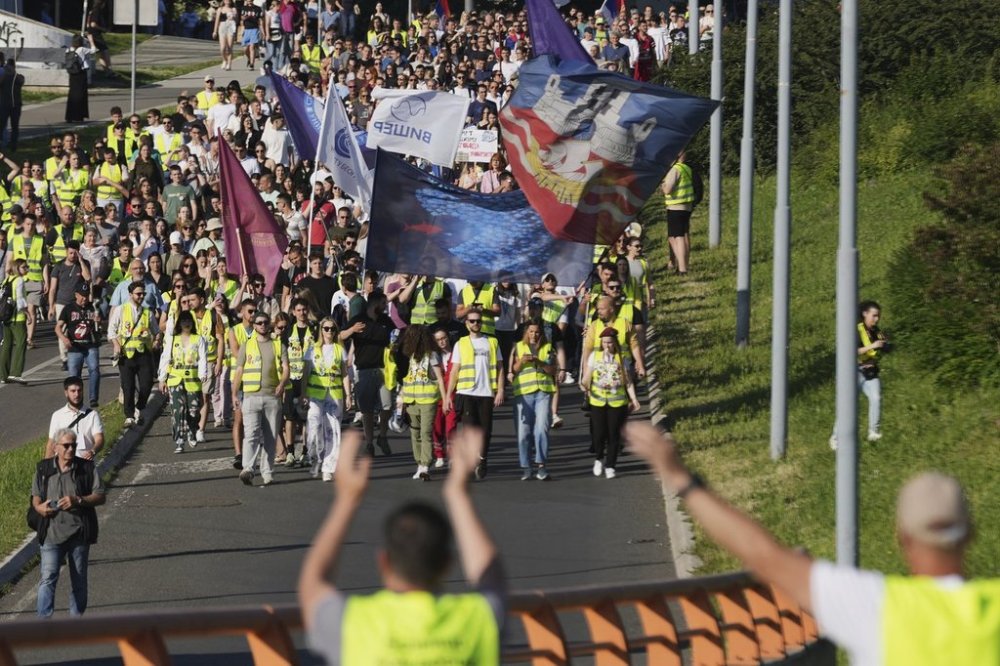Serbia’s protesting students rally to mark 7 months since train station tragedy
Advertisement
Read this article for free:
or
Already have an account? Log in here »
To continue reading, please subscribe:
Monthly Digital Subscription
$0 for the first 4 weeks*
- Enjoy unlimited reading on winnipegfreepress.com
- Read the E-Edition, our digital replica newspaper
- Access News Break, our award-winning app
- Play interactive puzzles
*No charge for 4 weeks then price increases to the regular rate of $19.00 plus GST every four weeks. Offer available to new and qualified returning subscribers only. Cancel any time.
Monthly Digital Subscription
$4.75/week*
- Enjoy unlimited reading on winnipegfreepress.com
- Read the E-Edition, our digital replica newspaper
- Access News Break, our award-winning app
- Play interactive puzzles
*Billed as $19 plus GST every four weeks. Cancel any time.
To continue reading, please subscribe:
Add Free Press access to your Brandon Sun subscription for only an additional
$1 for the first 4 weeks*
*Your next subscription payment will increase by $1.00 and you will be charged $16.99 plus GST for four weeks. After four weeks, your payment will increase to $23.99 plus GST every four weeks.
Read unlimited articles for free today:
or
Already have an account? Log in here »
BELGRADE, Serbia (AP) — Thousands of people on Sunday vowed to keep on fighting for justice and rule of law in Serbia as they demanded that President Aleksandar Vucic call a snap parliamentary election following months of persistent demonstrations that have challenged his firm grip on power in the Balkan country.
Protesters led by university students blocked bridges in the capital Belgrade and rallied in 30 other Serbian cities and towns as they also marked exactly seven months since a concrete canopy collapsed at a train station in the north, killing 16 people and sparking the massive wave of anti-corruption protests.
“The whole of Serbia has risen,” protesting students said in a speech that was read at all the rallies at the same time. “There will be no more silence, there will be no more surrender!”

Many people in Serbia believe that the deadly Nov. 1 canopy collapse in Novi Sad was the result of flawed renovation work on the station building, and they link the disaster to alleged government corruption in major infrastructure projects with Chinese state companies.
Vucic, whom critics have accused of imposing authoritarian rule in Serbia since coming to power over a decade ago, initially dismissed the possibility of holding early elections but on Friday suggested they could take place, though without saying exactly when.
Sunday’s protests included commemoration ceremonies for the victims of the Novi Sad crash and student marches and blockades. In Belgrade, crowds halted traffic at two key bridges over the Sava River for three hours, while protesters in Novi Sad carried a white wreath for the canopy collapse victims as they walked toward the crash site.
Mina Miletic, from Belgrade, said she is encouraged by so many people fighting together for the same goal: “The rule of law and life in a decent country.”
Vucic has accused the protesters of working for unspecified Western powers to “destroy Serbia.” Pro-government media on Sunday described the blockades in Belgrade as “terror” and alleged falsely that “only a handful” of people joined the rallies.
Most media in Serbia are controlled by the ruling populists, often lashing out at government opponents and accusing them of anti-state activities.
The student movement is seeking a snap vote, arguing that the current government cannot meet their demands for justice for the crash victims. Presidential and parliamentary elections are otherwise due some time in 2027.
No one has been sentenced in connection with the tragedy in Novi Sad and doubts prevail that ongoing legal proceedings will uncover the alleged corruption behind the crash.
Serbia is formally seeking European Union entry but the ruling populists have been accused of clamping down on democratic freedoms, including free media. Vucic’s authorities have stepped up pressure on protesters, including police detentions, intimidation and physical attacks.

